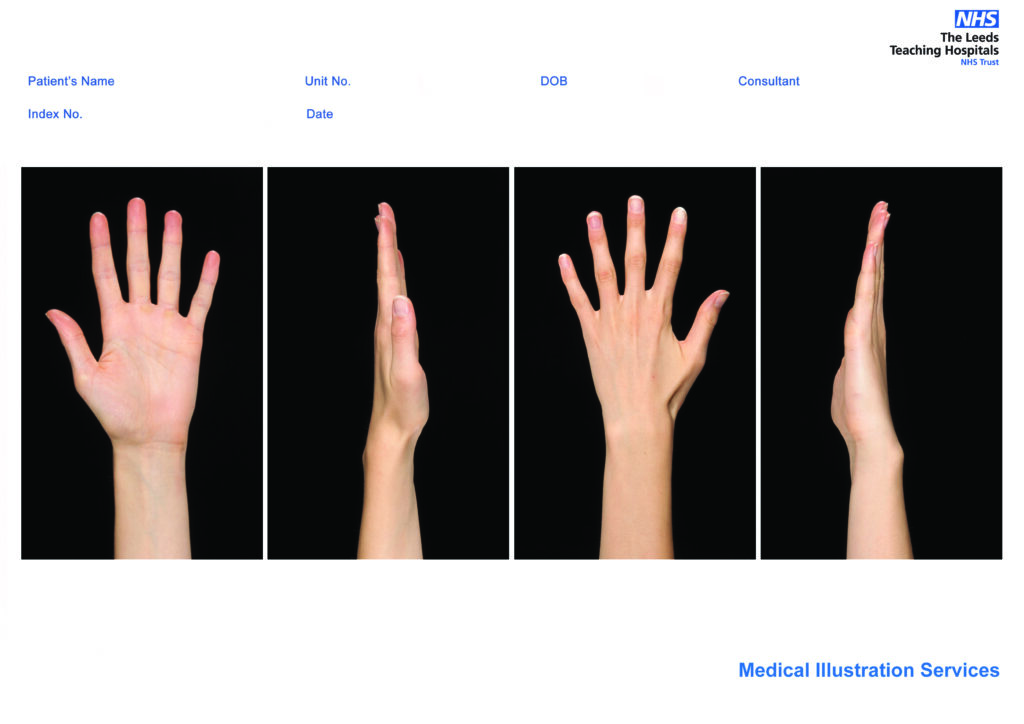During your visit to the Leeds Teaching Hospitals, you may be asked to have some clinical photographs or video taken. This leaflet explains why this is important and what will happen.
What is a clinical photograph/video?
Your photographs will be taken with a digital camera (or video will be recorded on a video camera), to provide an accurate visual record of your condition. This can be useful for your doctor to see any changes in the condition or any improvement with treatment.

Do I have a choice about whether to have photographs/video taken?
Yes. As with any medical procedure, your doctor should explain why the photographs/video are needed and what they will be used for.
You will always be asked for your permission before the photographs/video are taken and will be given a consent form to sign.
If you change your mind afterwards, depending on what the photographs/video have been used for, you may be able to withdraw your permission.
What will the photographs/video be used for and who will see them?
The photographs will be stored confidentially on the Trust’s Medical Image Database as part of your medical notes.
They will only be used by healthcare professionals involved in your care.
You may be asked to consent to either of the following levels, for the intended uses of your clinical recordings:
- Level 1: Patient Record
Level 1 consent is for recordings which are made for your treatment or assessment. Recordings for treatment or assessment of your care where you cannot be identified, may also be used within the clinical setting, for education or research. - Level 2: Education or Research, within the Clinical Setting
Recordings given Level 2 consent are for use in education or research within the clinical setting and includes Level 1 consent. - Level 3: Publication or Other Uses
Recordings given level 3 consent are for any other use; for example for use in a book, website or promotional material. It includes Levels 1 and 2 consent.
Who takes the photographs/video?
You will be photographed by a Clinical Photographer who is specially trained in taking clinical photographs and video.
Where possible, both male and female photographers will be available. However, if this is not the case and you would prefer a photographer of the same sex, we can make you an appointment to return to the department for photographs at a later date.
Where will the photographs/video be taken?
There are clinical photography studios at Leeds General Infirmary, St James’s University Hospital and Chapel Allerton Hospital. If you are unable to come to the studio, a photographer will come to the ward or clinic to photograph you.
What will happen?
You will be seen by a photographer as soon as possible. If the photographer is with another patient, there may be a short wait. The photographer will discuss with you the photographs/video to be taken and explain the different views needed.
You may be asked to remove items of clothing, jewellery or make-up so that a good, clear photograph/video can be taken. A changing room and gown will be provided and a chaperone can be present if you wish.
How are the photographs/video stored?
The images are uploaded to the Trust’s secure Medical Image Manager. Access to this database is restricted and storage and retrieval of images is carried out under information governance guidelines. The photographs/video are kept for the same length of time as your medical records and are covered by the Data Protection Act.
We understand that you may feel nervous about having photographs taken.
We aim to make the experience as simple and quick as we can for you.
If you have any questions or need any further information, please feel free to discuss this with one of our qualified clinical photographers (via the contact details below).